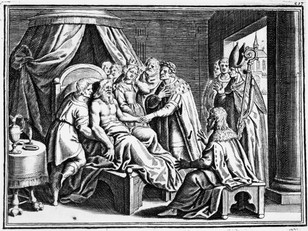Bibliography:
"Charlemagne." Charlemagne. N.p., n.d. Web. 18 Jan. 2015.
"Charlemagne Crowned as Holy Roman Emperor." Christianity.com. N.p., n.d. Web. 18 Jan. 2015.
"Charlemagne." History.com. A&E Television Networks, n.d. Web. 18 Jan. 2015.
"Charlemagne." History.com. A&E Television Networks, n.d. Web. 18 Jan. 2015.
"Reign of Charlemagne and Development." Reign of Charlemagne and Development. N.p., n.d. Web. 18 Jan. 2015.
Snell, Melissa. "Einhard - A Biography." N.p., n.d. Web. 18 Jan. 2015.
"World Biography." Charlemagne Biography. N.p., n.d. Web. 18 Jan. 2015.
"World Heritage Encyclopedia." Saxon Wars. N.p., n.d. Web. 18 Jan. 2015.
Sunday, January 18, 2015
Timeline:
742: Charlemagne born.
768: Charlemagne and Carloman rule together.
771: Charlemagne becomes sole ruler of the thrown.
772: Charlemagne begins war with the Saxons.
782: Charlemagne orders the deaths of 4,500 Saxons in an attempt to convert them to Christianity.
788: Charlemagne conquers the Bavarian tribe, bringing all Germanic territories into one.
789: Admonitio generalis written as a new set of laws for the empire.
800: Charlemagne crowned Holy Roman Emperor by the Pope.
804: End of Saxon war
813: Charlemagne crowns his son Louis.
814: Charlemagne dies.
742: Charlemagne born.
768: Charlemagne and Carloman rule together.
771: Charlemagne becomes sole ruler of the thrown.
772: Charlemagne begins war with the Saxons.
782: Charlemagne orders the deaths of 4,500 Saxons in an attempt to convert them to Christianity.
788: Charlemagne conquers the Bavarian tribe, bringing all Germanic territories into one.
789: Admonitio generalis written as a new set of laws for the empire.
800: Charlemagne crowned Holy Roman Emperor by the Pope.
804: End of Saxon war
813: Charlemagne crowns his son Louis.
814: Charlemagne dies.

Einhard writing Charlemagne's biography
Einhard wrote the "Life of Charles the Great," a biography of Charlemagne. The book was written in Latin and considered a masterpiece due to it's beautiful language. Within the book, there is accounts of Einhard's experiences with Charlemagne as a friend and advisor. The contents cover Charlemagne's achievements as a King and parts of his personal life. The book was popular during the Middle Ages and greatly affected the leaders to come.
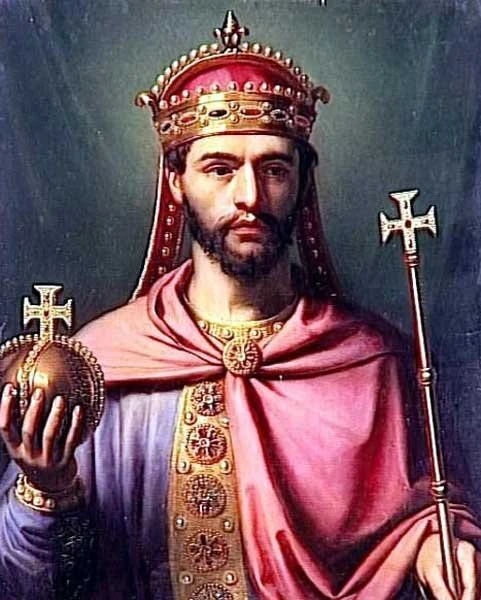
Einhard worked as an advisor for Louis the Pious after working for Charlemage
Einhard quickly became a trusted scholar, advisor, and friend to King Charlemagne. He accompanied the King on all of his travels, including to Rome where he was crowned. Charlemagne trusted Einhard with overseeing construction of several important buildings and as a diplomat. He became a secretary to Louis the Pious, Charlemagne's son, when he took throne after his father's death. He continued to perform diplomatic duties and tutor Louis's sons.
The monastery, Aix-la-Chapelle, where Einhard studied
Einhard was born in Francia in 770. His parents were Einhart and Englifrit, noble landowners. In 779, Einhard went to a monastery in Fulda to be educated. He studied Latin, scripture, and writing. He was unusually intelligent. He was sent to Aachen in 791 to finish his schooling at the Palace School, where he met and became acquainted with royals.
Saturday, January 17, 2015

Representative reports back to Charlemagne
Charlemagne's empire was organized into 350 counties. Each county was led by an appointed count who served as judges and administrators. To create loyalty, Charlemagne created Missi Dominici. This system allowed one representative from the church and one representative from the emperor to yearly check on each county, reporting back to Charlemagne. This allowed Charlemagne to keep each county under control.
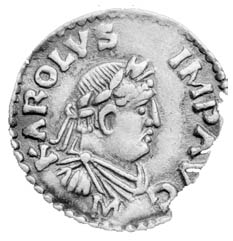
Silver coin depicting Charlemagne
Charlemagne made a change to the currency that lasted for hundreds of years. He changed the gold coin to silver and standardized the currency throughout most of Europe. A change that he made that also lasted for hundreds of years was his dedication to education. He introduced Latin as the language of scholarly study, creating a well known pure romantic language. He also built monastic schools, increasing the number of educated individuals in his empire.

Charlemagne welcoming new officers to enforce his laws
Charlemagne created structured law enforcement and criminal punishment, breaking away from the personalized system that had no rhyme or reason. He created a judicial system that consisted of a count who judged and sentenced people. It can be argued that Charlemagne created the judicial system that still exists today.
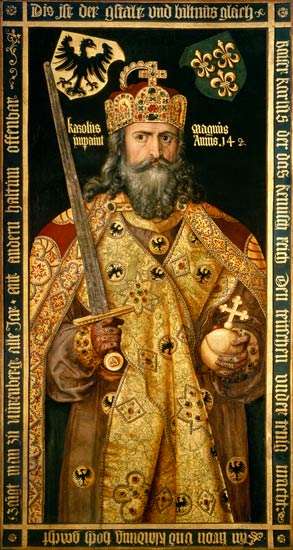
Charlemagne after being crowned, shortly before writing laws
In his empire, Charlemagne implemented and reformed laws which helped develop the medieval monarchy called Admonitio generalis. Charlemagne was the first king to write his own laws for his kingdom. He took the laws of his people, including those he conquered, to create a set of laws that his entire kingdom could live by. Some provinces had slightly different laws, but overall, it was the Frankish law that ruled. He implemented his laws by having leading members of each province read them aloud. Many of the laws pertained to new Christian reforms.

Charlemagne crowned Emperor
On Christmas day in the year 800, Charlemagne was at Mass in St. Peter's Rome. Suddenly Pope Leo III placed a golden crown upon his head. Charlemagne became the Holy Roman Emperor. He was the first emperor since Romulus Augustulus in 476. The Pope crowned Charlemagne out of thanks for the safety the Franks had given him. The crowning also represented Rome;s independence from the Greek Empire in Constantinople. Though it may seem that the Pope had power over Charlemagne, the emperor continued to appoint bishops and counts.
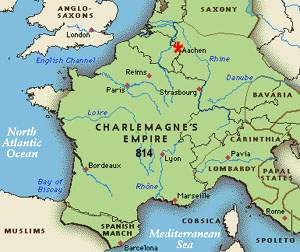
Charlemagne's Empire
During his rule, Charlemagne also conquered the Avards in 791-795, allowing his land to expand to the east. He conquered Bavarian and many Muslim tribes, allowing his country to expand immensely. His conquering allowed for Western Europe to reunite for the first time since the Roman rule.
.jpg)
Charlemagne accepts Widukind's defeat
Charlemagne's goal as an emperor was to unite his kingdom under Christian rule. After defeating the Lombards he began a three decade long war with the Saxons beginning in 772 continuing through 804. The Saxons were a Germanic tribe of Pagan worshippers led by Widukind. The war was long and ruthless. Charlemagne demanded that all Saxons convert to Christianity and be baptized, otherwise they would be killed. Thousands of Saxons died in battle and refusal to convert.

Charlemagne's soldiers conquer the Lombards
Once the sole leader of the Franks in 771, Charlemagne sought to unite all Germanic people into one kingdom. He started his quest by conquering the Lombards in modern day Italy. The Lombards had been forced to give up land to the Franks under Pepin's rule which became land for the Papacy states. King Desiderius became irritable and wanted his lands back, angering Charlemagne. Charlemagne sent his wife back to the King and proceeded to invade Lombardy. He conquered the land and declared himself the King of the Lombards.
Thursday, January 15, 2015
_et_Carloman_(vers_866-884).jpg/210px-Charles_Auguste_Guillaume_Henri_Fran%C3%A7ois_Louis_de_Steuben_-_Louis_III_(vers_863-882)_et_Carloman_(vers_866-884).jpg)
Charlemagne and Carloman
Subscribe to:
Posts (Atom)
